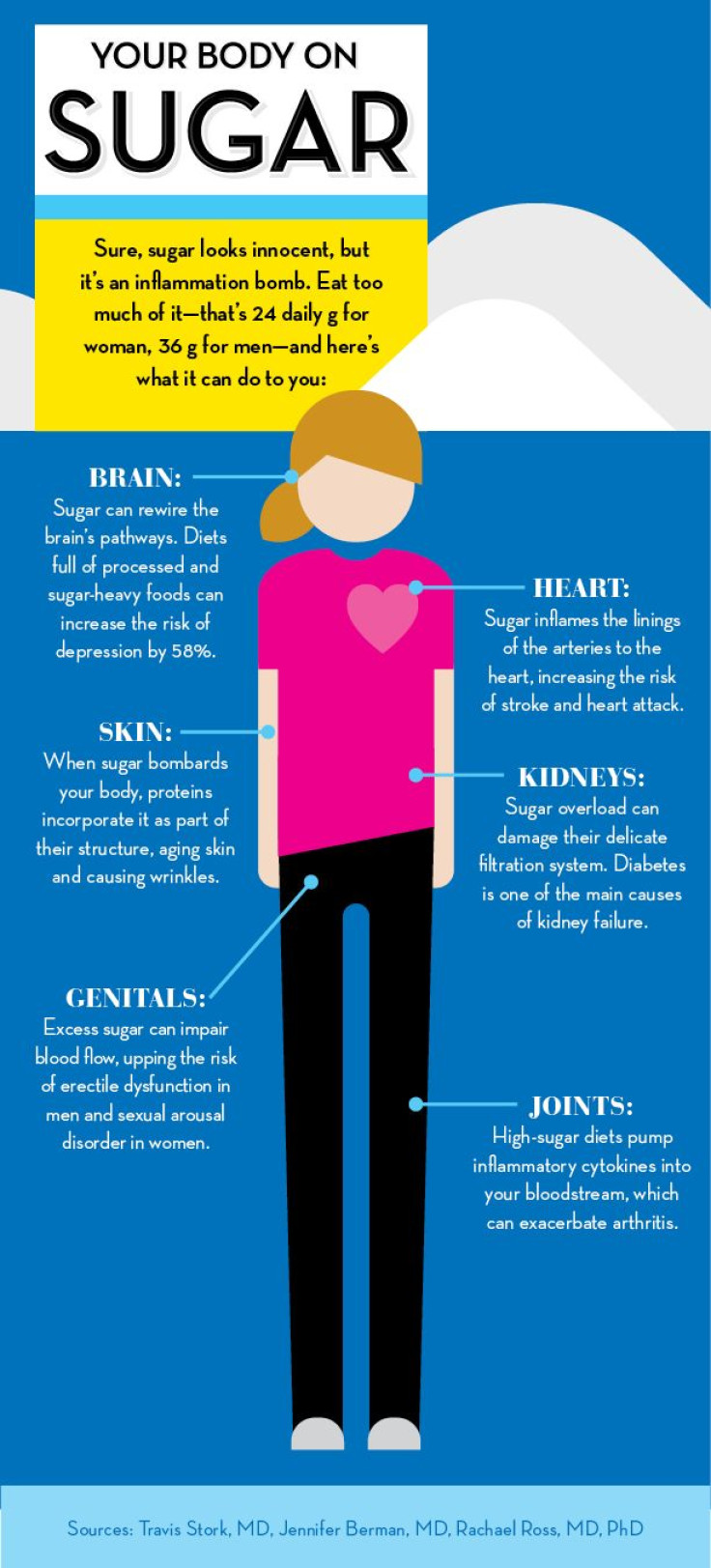Sugar Addiction Doesn't Just Lead To Obesity; It Affects Your Heart Health, Brain Function, And Even Your Sex Life

In moderation, sugar is essential for a healthy body. Millions of years ago our ancestors relied on sugar-rich fruit for survival. Not only did the nutrient give them enormous amounts of energy, but it also helped in the storage of fat — something which could be the difference between life and death during hard times. Those who didn’t consume enough sugar had neither the energy nor physical capabilities to reproduce and therefore were unable to pass on their genes.
As a result, the human brain evolved an interesting survival mechanism: a near-insatiable desire for sweetness. Sadly, in modern days this evolutionary edge often does more harm than help. Many, especially in the United States, consume far more sugar than is needed for survival. While weight gain and teeth decay may be the most obvious consequences of excessive sugar consumption, there are many other “hidden” effects of consuming too much of the sweet stuff.
Heart
When consumed, sugar enters into the blood stream, and at high levels blood sugar has adverse effects on our most important organ: the heart. In a 2013 study published in the Journal of the American Heart Association, researchers found that large amounts of sugar, particularly glucose, stressed out the heart and decreased the muscle’s function. If left to progress for too long, this eventually leads to heart failure, The Cleveland Clinic reported.
High amounts of fructose, another type of sugar commonly found in artificially sweetened food, lowers levels of “good” cholesterol, Women’s Health reported. This can trigger the production of a certain type of fat known as triglycerides, which travel from the liver to the arteries and increase your risk for experiencing a heart attack or stroke.
Brain
A 2002 study conducted at the University of California, Los Angeles, stumbled upon a frightening link between excessive sugar consumption and brain health. The study found that diets high in sugar affected the neuronal and behavioral plasticity associated with a chemical known as brain-derived neurotrophic factor (BDNF). This leads to decreased function in the ability to efficiently form new memories and store new information. Other research has also linked low levels of this chemical to depression and dementia.
Kidneys
The kidneys play an important role in filtering our blood, so high levels of sugar in the blood can cause excessive work and subsequent damage. High amounts of blood sugar are known to be one of the main contributors to type 2 diabetes. Many years of excessive sugar filtration seriously compromise kidney function and this may lead to waste products leaking into the body.
According to the American Diabetes Association, the eventual result of decreasd kidney function is kidney disease. If left untreated, the kidney will completely fail. Individuals with kidney failure need to receive an organ transplant or have their blood filtered by a machine via dialysis.

Sexual Health
Because high amounts of sugar in a diet can affect blood flow, excessive sugar consumption is also linked to erectile dysfunction in men. A 2005 study from The Johns Hopkins University School of Medicine found that one particular sugar interferes with the chain of events needed to achieve and maintain an erection. The blood sugar, O-GlcNAc, is present in elevated levels in those with diabetes and has been observed to interrupt the enzyme responsible for a successful erection, News Medical reported.
A 2007 study also found that consuming too much fructose and glucose could turn off the gene that regulates the levels of active sex testosterone and estrogen, two important human sex hormones.
Joints
Arthritis is a term used to describe various types of joint pain and inflammation. According to a 2002 study published in the American Journal of Clinical Nutrition, in elevated levels processed sugar can increase the inflammation which causes joint pain. For this reason, those who suffer from chronic arthritis are advised to keep their sugar consumption low, although individuals of various health descriptions will benefit from a low sugar diet.
Skin
Dr. Nicholas Perricone, a dermatologist and nutritionist, told The Huffington Post that large consumptions of sugar are “a burst of inflammation throughout the body." Just as the inflammation caused by sugar can lead to joint pain, this same inflammation breaks down the collagen and elastin in our skin.
The unfortunate result of this is an acceleration of the aging process and increased sagging skin and wrinkles. Those with high sugar diets are also more likely to develop insulin resistance, which can cause excess hair growth and dark patches to appear on the neck and in body creases.
Liver
The liver is not immune to the effects of excessive sugar consumption. High sugar diets lead to fat build-up in the liver which, in some cases, causes the liver to become inflamed. If left untreated, this will eventually have the same effect on the liver as excess alcohol consumption, which leads to the formation of scar tissue, a condition known as cirrhosis.
“The most common cause of liver cirrhosis is alcohol, and after that it's fatty liver disease, from bad diet,” Dr. Aseem Malhotra, a London cardiologist and member of the Academy of Medical Royal Colleges obesity group told The Daily Mail.



























